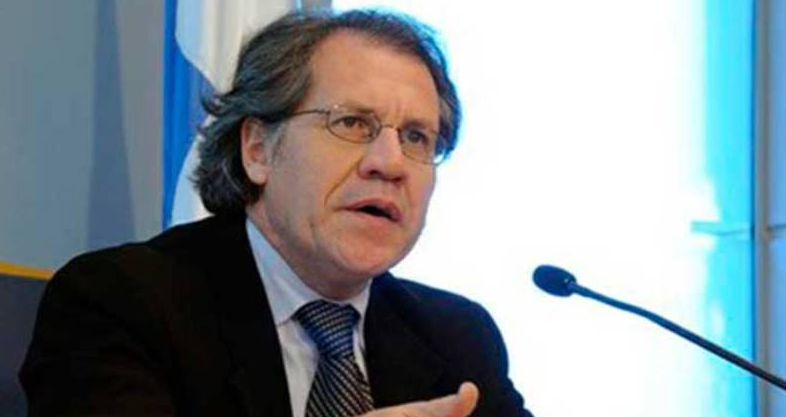Latin America Advisor
A Daily Publication of The Dialogue
Should Venezuela Be Suspended From the OAS?
 OAS Secretary-General Luis Almagro has said Venezuela should hold elections or be suspended from the organization.
OAS Secretary-General Luis Almagro has said Venezuela should hold elections or be suspended from the organization.
Organization of American States Secretary-General Luis Almagro said last week that Venezuela should be suspended from the group if it does not hold elections “as soon as possible.” Venezuelan President Nicolás Maduro’s government has frequently dismissed Almagro as working in the interests of the United States. Should the OAS suspend Venezuela? What would result from such a suspension? Is Almagro taking the right approach in relation to Venezuela?
Francisco Márquez, nonresident fellow at The Ash Center for Democratic Governance and Innovation at Harvard University’s John F. Kennedy School of Government: "Secretary-General Luis Almagro’s 75-page report on the systematic human rights abuse that occurs in Venezuela is incredibly important for Venezuelans and for the region. Almagro is using the current international norm that all countries within the Organization of American States have signed and ratified. He has laid out recommendations in his report in order to avoid Venezuela’s suspension, making it clear that a move toward elections and reinstating the democratic order would be a move in the right direction. Among the most egregious examples of human rights abuse and deterioration of democracy is the statistic of almost 300 cases of torture of political prisoners, mostly done to incriminate other political activists and opposition leaders. Furthermore, Almagro outlines how all international efforts started last year to move dialogue forward have yielded few results. Since efforts at dialogue began, there are more political prisoners, the Venezuelan Supreme Court continues to annul all laws passed by the National Assembly and neither the gubernatorial elections nor any national election stipulated in the Venezuelan Constitution has been allowed. It is very uncomfortable for countries to have to face the fact that Venezuela is a dictatorship. The evidence presented in the new report is overwhelming. No country has been able to contradict the facts. This is important to remember when other actors try to make this report into a political fight. The charter of the OAS is about democracy and human rights; whether the region understands that is a different issue."
Julia Buxton, professor of comparative politics at the School of Public Policy of Central European University in Budapest: "Why would the OAS suspend Venezuela now when a line was crossed years ago? And why just Venezuela? If the Inter-American Democratic Charter is a lived set of processes and norms, there are countries south and now north of the Americas that merit scrutiny. The problem for the OAS is its declining capacity, credibility and ability to convoke action. On the one hand, its historical pre-eminence is eroded by new regional blocks; on the other, it faces major financial constraints that will be exacerbated by proposed executive cuts to U.S. State Department funding. Add to that the reticence of member states to involve themselves in the domestic affairs of neighbors, and you have a recipe for inaction – but also clumsy intervention. Enter Luis Almagro. Last May, Almagro published a damning report on Venezuela, but he failed to build the two-thirds majority among member countries to advance a suspension. Not having learned the lesson of necessary coalition building and quiet diplomacy from his last foray into Venezuelan affairs, Almagro now demands a call for fresh elections in 30 days and the release of 97 prisoners. As in 2016, it will be surprising if a majority of OAS countries get behind the suspension, including because in the absence of a competent opposition with a clear program of government and commitment to the rule of law, there is a real sense that such a move will do more harm than good. Suspension may modestly affect the Maduro government’s already waning domestic legitimacy, but it will not facilitate a peaceful transition or long-term stabilization of the country."
John F. Maisto, former U.S. ambassador to Venezuela, Nicaragua and the OAS and former senior director for the Western Hemisphere at the National Security Council: "Secretary-General Almagro’s principled focus on early local elections and freeing political prisoners to address the Venezuelan impasse credibly is bold and timely. Grounded on defense of democracy and human rights, it is in line with the Venezuelan Constitution and the Inter-American Democratic Charter. It is as well an effort to make the OAS relevant at a time when its usefulness is being questioned. Almagro’s latest salvo, if accompanied by a variety of diplomatic efforts—the still-existing three leader negotiating team led by former Spanish Prime Minister Rodríguez Zapatero, Vatican input, a South American leader initiative and quiet U.S. engagement—could produce a breakthrough to get the sides back to the negotiating table. Enough OAS votes (18) to put Venezuela on the Permanent Council front-burner but not enough for expulsion (24) would increase pressure on the divided, Chavista-legacy government. Such international criticism would be devastating for President Maduro. Even more pressure would come from the deteriorating humanitarian situation—a dire lack of food and medicine—and increased international economic pressures that include needed approval of the opposition-controlled National Assembly to receive loans. What a worried Venezuelan military would do (or not) is an enigma. Almagro’s challenge opens the door again for hemispheric leaders to lead diplomatically within the OAS to apply pressure. The United States, with quiet diplomacy, would be crucial in such efforts. But outsiders can do only so much. Chances for a non-violent, constitutional, legal out-come can emerge only from Venezuelans themselves."
The Latin America Advisor features Q&A from leaders in politics, economics, and finance every business day. It is available to members of the Dialogue's Corporate Program and others by subscription.



















